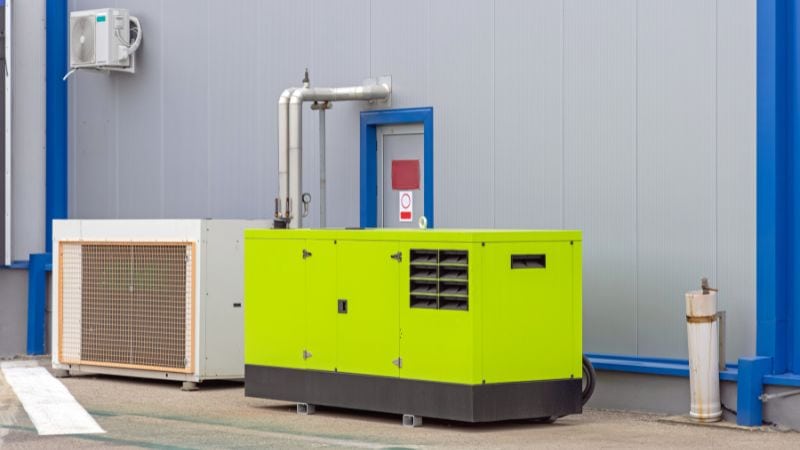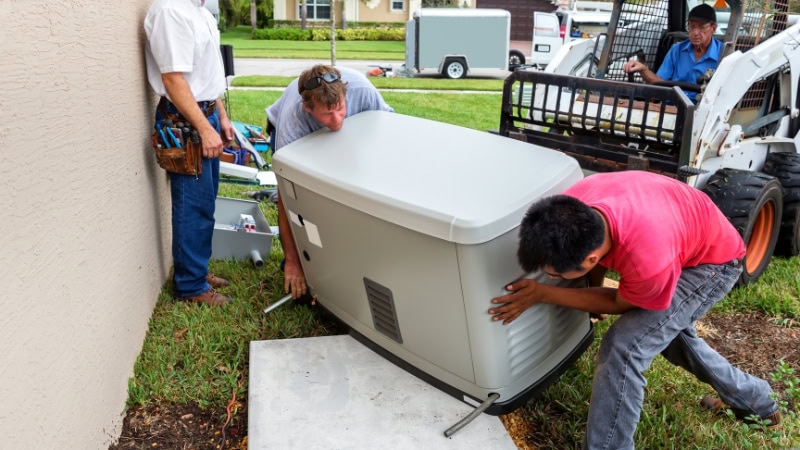
Power outages are more than an inconvenience; they are a disruption to our daily lives, safety, and comfort. While their duration is unpredictable, our response doesn’t have to be. A standby generator is the definitive solution, automatically restoring power to your home within seconds of a blackout.
This guide will explore how standby generators work, the different types available, their significant benefits, and the key considerations for a smooth installation.
What Is a Standby Generator?

A standby generator is a permanently installed backup power system that automatically activates during a power loss. Unlike portable generators, which require manual operation and fuel management, standby generators connect directly to your home’s electrical system and can power critical appliances, lights, and systems without any human intervention. They run on natural gas or liquid propane and are designed to provide seamless power restoration, making them an ideal choice for homeowners who want reliability and convenience.
How Does a Standby Generator Work?
The operation of a standby generator involves several key components that work together to ensure your home receives power when needed:
- Automatic Transfer Switch (ATS): This device monitors the electrical supply. When it detects a power failure, it automatically disconnects your home from the utility grid and starts the generator.
- Generator: The heart of the system, the generator itself, kicks in to restore power. It uses natural gas or propane as fuel and can provide electricity in just seconds after the outage is detected.
- Electrical Panel Integration: Standby generators are usually integrated with your home’s electrical panel, allowing them to supply power to selected circuits or the entire house, depending on the generator’s capacity.
In a brief, a standby generator operates through a fully automated transfer system. Once the generator is running properly, an automatic transfer switch safely shifts the electrical load from the utility grid to the generator.
The entire process typically takes only seconds. It ensures a smooth transition, keeping your essential systems functioning without interruption.
Once utility power is restored, the transfer switch reconnects the building to the main grid and signals the generator to shut down, returning to its standby mode to await the next outage.
Benefits of Standby Generators
Investing in a standby generator comes with numerous advantages:
- Automatic Operation: Standby generators automatically turn on during power outages and switch off when power is restored, providing seamless service without your involvement.
- Consistent Power Supply: Whether it’s for essential appliances like refrigerators, heating or cooling systems, or critical devices like medical equipment, you’ll have peace of mind knowing they’ll keep running.
- Increased Home Value: A standby generator can increase your home’s resale value. Many buyers view a generator as a valuable asset, especially in areas prone to frequent outages.
- Safety and Comfort: Having a reliable power source improves safety and comfort during outages, keeping your home secure and livable.
- Fuel Options: Since they can run on natural gas or propane, standby generators are flexible in terms of fuel supply. This allows for easier refueling and longer operation without needing additional fuel storage.
Types of Standby Generators
Standby generators can be categorized in several ways, including by their power rating, fuel type, and physical design. The table below summarizes the main types to help you understand your options.
| Classification | Type | Key Features | Typical Applications |
|---|---|---|---|
| Power Rating & Usage | Standby Power | For emergency use during power outages; limited annual run time (e.g., up to 500 hours); not designed for continuous operation. | Hospitals, Data Centers, Residential Backup Power. |
| Prime Power | Can serve as a main power source; designed for long-term use; allows for variable loads and temporary overloads. | Remote Mining/Construction Sites, Agricultural Operations. | |
| Continuous Power | Runs at a consistent 100% load for unlimited time; used where the generator is the only power source. | Critical applications requiring non-stop power. | |
| Fuel Type | Diesel & Gasoline | Common fuel types; diesel generators are known for low cost and high efficiency. | Widely used in various commercial and industrial settings. |
| Natural Gas & Propane (LPG) | Cleaner-burning fuels; often used in residential and small commercial standby generators. | Home backup power, small businesses. | |
| Portability & Form Factor | Stationary / Standby | Permanently installed units; automatically start during a power outage; typically have more power and sophisticated controls. | Homes, Large Commercial Buildings, Healthcare Facilities. |
| Portable | Not permanently installed; used with standalone applications; typically provides power for shorter durations. | Job Sites, Temporary Events, Low Backup Power Needs |
How to Choose the Right Standby Generator
Selecting the correct generator depends heavily on your specific needs. Here are the key factors to consider:
Assess Your Power Needs: Calculate the total wattage of the appliances and systems you need to run during an outage (e.g., lights, refrigerator, heating/cooling system). This will determine the power rating (kVA or kW) you require. Residential units are often categorized below 22kW, 22-60kW, and above 60kW.
Consider Fuel Availability: Your choice may be influenced by the fuel most readily available in your area. Diesel is often preferred for its efficiency in commercial applications, while natural gas is a common choice for residential standby generators as it connects to existing gas lines.
Understand Your Usage Scenario: Your primary goal is the most important differentiator.
- Choose a Standby generator if you need automatic, emergency backup power for your home or business during grid failures.
- Choose a Prime Power generator if you need a reliable primary power source for a remote site, construction project, or a location with no grid access.
Standby Generator Installation Considerations

Installing a standby generator involves careful planning and consideration:
- Permits and Regulations: Check local regulations and obtain necessary permits before installation. Local codes may dictate specific installation requirements.
- Fuel Source: Decide on a fuel source, natural gas or propane, and ensure your home is equipped to supply and support it effectively.
- Electrical Capacity: Assess your home’s electrical needs to choose a generator that can adequately power all essential circuits.
- Location: The generator should be installed in an easily accessible outdoor location, compliant with safety regulations about distance from windows and vents.
- Professional Installation: It’s advisable to have the generator installed by a certified electrician or professional to ensure safety and compliance with all regulations.
Taking the time to consider these factors will lead to a smoother installation process and a more reliable power supply.
Frequently Asked Questions
What is the main difference between a standby generator and a portable generator?
The key difference is in installation and operation. A standby generator is a permanent, automatic system that is professionally installed and connects directly to your home’s electrical system and fuel line (natural gas or propane). It turns on automatically during an outage. A portable generator is a mobile, temporary solution that you must roll out, start manually, and connect to appliances via extension cords, requiring you to refill its gas or propane tank.
How long can a standby generator run continuously?
A residential standby generator designed for standby power can typically run for as long as necessary during a power outage, provided it has a continuous fuel supply. Models connected to a natural gas line can run indefinitely. However, manufacturers recommend a maintenance schedule (e.g., oil changes) after a certain number of run hours, often around 24-48 hours of continuous use, to ensure longevity.
Is it safe to run a standby generator in the rain or snow?
Yes, standby generators are built for outdoor installation and are designed to withstand various weather conditions, including rain and snow. They are housed in durable, weather-proof enclosures. However, proper installation is critical—they must be placed on a stable, level surface (like a concrete pad) with proper clearances from the house and any air intakes to ensure safe ventilation and operation.
How much does a standby generator cost, including installation?
The total cost can vary widely based on the generator’s size, brand, and installation complexity. For a typical whole-house standby generator system, homeowners can expect a total cost (unit + professional installation) ranging from $10,000 to $20,000 or more. Smaller systems that power only essential circuits may start around $5,000. It’s crucial to get quotes from certified installers for an accurate price.
Can I install a standby generator myself?
It’s advisable to have a standby generator installed by a certified professional to ensure safety, compliance with local regulations, and proper integration with your home’s electrical systems.
Conclusion
In a world of uncertainty, a standby generator provides a rare and valuable commodity: absolute certainty. It is the definitive safeguard that ensures your family’s safety, comfort, and normalcy are never left to chance. By making this investment, you are not just purchasing a machine; you are securing uninterrupted power for your peace of mind, making your home a true sanctuary.
